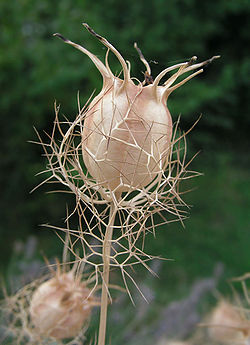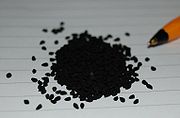
Nigella
Background Information
SOS Children, which runs nearly 200 sos schools in the developing world, organised this selection. A good way to help other children is by sponsoring a child
- This article is about the plant. Nigella can also be a personal name; see e.g. Nigella Lawson.
| Nigella | |
|---|---|
 |
|
| Nigella damascena seed capsule | |
| Scientific classification | |
| Kingdom: | Plantae |
| Division: | Magnoliophyta |
| Class: | Magnoliopsida |
| Order: | Ranunculales |
| Family: | Ranunculaceae |
| Genus: | Nigella L. |
| Species | |
|
About 14, including: |
|
Nigella is a genus of about 14 species of annual plants in the family Ranunculaceae, native to southern Europe, north Africa and southwest Asia. Common names applied to members of this genus are Devil-in-a-bush or Love in the mist.
The species grow to 20-90 cm tall, with finely divided leaves, the leaf segments narrowly linear to threadlike. The flowers are white, yellow, pink, pale blue or pale purple, with 5-10 petals. The fruit is a capsule composed of several united follicles, each containing numerous seeds; in some species (e.g. Nigella damascena), the capsule is large and inflated. Spread some in your yard, and it will reseed itself every year.
Uses
Culinary
The seeds of N. sativa, known as kalonji, black cumin (though this can also refer to Bunium persicum) or just nigella, are used as a spice in Indian and Middle Eastern cuisine. The dry roasted nigella seeds flavor curries, vegetables and pulses. The black seeds taste like oregano and have a bitterness to them like mustard-seeds. Most people use it as a "pepper" in recipes with pod fruit, vegetables, salads and poultry.
Other uses
Several species are grown as ornamental plants in gardens, popular for their seed capsules, which are used in dried flower arrangements. Love in the mist are used exclusively for dried arrangements. These flowers are the best to add texture to any dried flower arrangement. The delicate, purple striped pods are used in several arrangements for an airy effect.
In India the seeds are used as a carminative and stimulant to ease bowel and indigestion problems and are given to treat intestinal worms and nerve defects to reduce flatulence, and induce sweating. Dried pods are sniffed to restore a lost sense of smell. It is also used to repel some insects, much like mothballs.
Drying Nigella
Nigella can be easily dried. Nigella is cut when pods reach maximum size and colour. Nigella pods range from deep green to deep burgundy, with stripes in between. The first few pods are picked with as long a stem as possible, one at a time. The plant flowers profusely and so when most of the flowers become seed pods, pull the entire plant and cut the stems. Then wrap a rubber band around a small bundle of stems and then hang them upside down for drying in a dark, airy place until dry.
| This Ranunculales article is a stub. You can help Wikipedia by expanding it. |


